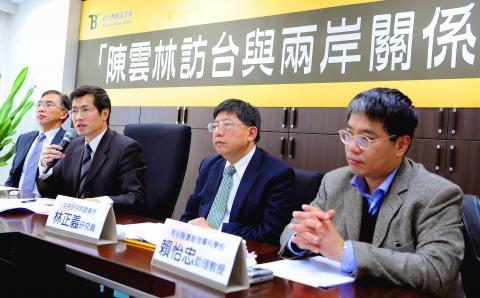The upcoming visit by a top Chinese envoy to central and southern Taiwan is a Chinese political tactic and highlights Beijing’s lack of confidence in President Ma Ying-jeou’s (馬英九) chances of getting re-elected next year, academics told a forum yesterday.
Lin Cheng-yi (林正義), a researcher at the Institute of European and American Studies at Academia Sinica, said the visit by Association for Relations Across the Taiwan Strait (ARATS) Chairman Chen Yunlin (陳雲林), who is arriving today, was politically significant because he would be visiting parts of the country that are considered to be more sympathetic to the Democratic Progressive Party (DPP).
“Although his sightseeing tour has been billed as business and economic in nature, the decision to skip Greater Tainan was made out of political consideration and had a lot to do with Zhang Mingqing (張銘清),” Lin told the forum on cross-strait affairs organized by Taiwan Brain Trust, a think tank.

Photo: Chu Pei-hsiung, Taipei Times
Zhang, the deputy chairman of ARATS, visited the Confucius Temple in Tainan in October 2008, where he had a close encounter with pro-independence politicians and advocates. Amid some jostling, the envoy fell to the ground, though it was unclear whether he tripped or was pushed.
Lai I-chung (賴怡忠), a researcher at Taiwan Thinktank, said Chen’s visit to central and southern Taiwan showed China’s lack of confidence in Ma’s chances of being re-elected next year.
After the special-municipality elections in November last year, Lai said Beijing realized it could not pin all its hopes on Ma winning the presidential poll.
“[As a result] they’re sending Chen to take things into its own hands,” Lai said.
“If Ma fails in his re-election bid, China will at least have something to fall back on,” Lai said.
China also made sure that Chen’s arrival and the start of the cross-strait Economic Cooperation Committee meeting would not take place at the same time, Lai said.
The committee meeting started yesterday.
By doing so, it could draw attention away from the committee, allowing it to evade the scrutiny of the legislature and undermine the functions of the Mainland Affairs Council (MAC) and Straits Exchange Foundation (SEF).
Tung Li-wen (董立文), a professor at the Graduate School of Public Security at Central Police University, said not only would the committee dictate future trade talks, but it would also weaken the functions of the MAC and the SEF.
Moreover, by bypassing legislative oversight, it could become a future conduit for political negotiations, Tung said.
He added that the committee could also become a “fourth track” communication channel between the Chinese Nationalist Party (KMT) and the Chinese Communist Party.
Taiwan Brain Trust chief executive Lo Chih-cheng (羅致政) said Chen’s visit was politically motivated and carefully choreographed.
“China is using its economic means in exchange for political gains,” Lo said.
“China’s purpose is clear: Do whatever it can to help Ma consolidate his power and win his re-election bid in 2012,” Lo said.
Aside from the locations Chen is expected to visit, Lo said the timing of the visit was interesting, coming as it does days before the 64th anniversary of the 228 Incident on Feb. 28.
The 228 Incident refers to a government crackdown on Feb. 28, 1947, in which thousands of protesters were killed by KMT security forces.
“China’s every move is premeditated and is never a spur-of-the-moment decision,” he said.

Taiwanese were praised for their composure after a video filmed by Taiwanese tourists capturing the moment a magnitude 7.5 earthquake struck Japan’s Aomori Prefecture went viral on social media. The video shows a hotel room shaking violently amid Monday’s quake, with objects falling to the ground. Two Taiwanese began filming with their mobile phones, while two others held the sides of a TV to prevent it from falling. When the shaking stopped, the pair calmly took down the TV and laid it flat on a tatami mat, the video shows. The video also captured the group talking about the safety of their companions bathing

US climber Alex Honnold is to attempt to scale Taipei 101 without a rope and harness in a live Netflix special on Jan. 24, the streaming platform announced on Wednesday. Accounting for the time difference, the two-hour broadcast of Honnold’s climb, called Skyscraper Live, is to air on Jan. 23 in the US, Netflix said in a statement. Honnold, 40, was the first person ever to free solo climb the 900m El Capitan rock formation in Yosemite National Park — a feat that was recorded and later made into the 2018 documentary film Free Solo. Netflix previewed Skyscraper Live in October, after videos

Starting on Jan. 1, YouBike riders must have insurance to use the service, and a six-month trial of NT$5 coupons under certain conditions would be implemented to balance bike shortages, a joint statement from transportation departments across Taipei, New Taipei City and Taoyuan announced yesterday. The rental bike system operator said that coupons would be offered to riders to rent bikes from full stations, for riders who take out an electric-assisted bike from a full station, and for riders who return a bike to an empty station. All riders with YouBike accounts are automatically eligible for the program, and each membership account

A classified Pentagon-produced, multiyear assessment — the Overmatch brief — highlighted unreported Chinese capabilities to destroy US military assets and identified US supply chain choke points, painting a disturbing picture of waning US military might, a New York Times editorial published on Monday said. US Secretary of Defense Pete Hegseth’s comments in November last year that “we lose every time” in Pentagon-conducted war games pitting the US against China further highlighted the uncertainty about the US’ capability to intervene in the event of a Chinese invasion of Taiwan. “It shows the Pentagon’s overreliance on expensive, vulnerable weapons as adversaries field cheap, technologically